In this article:
An itchy foot refers to an urge to scratch your feet. This discomforting situation may stem from various reasons, such as an allergy or exposure to chemicals.
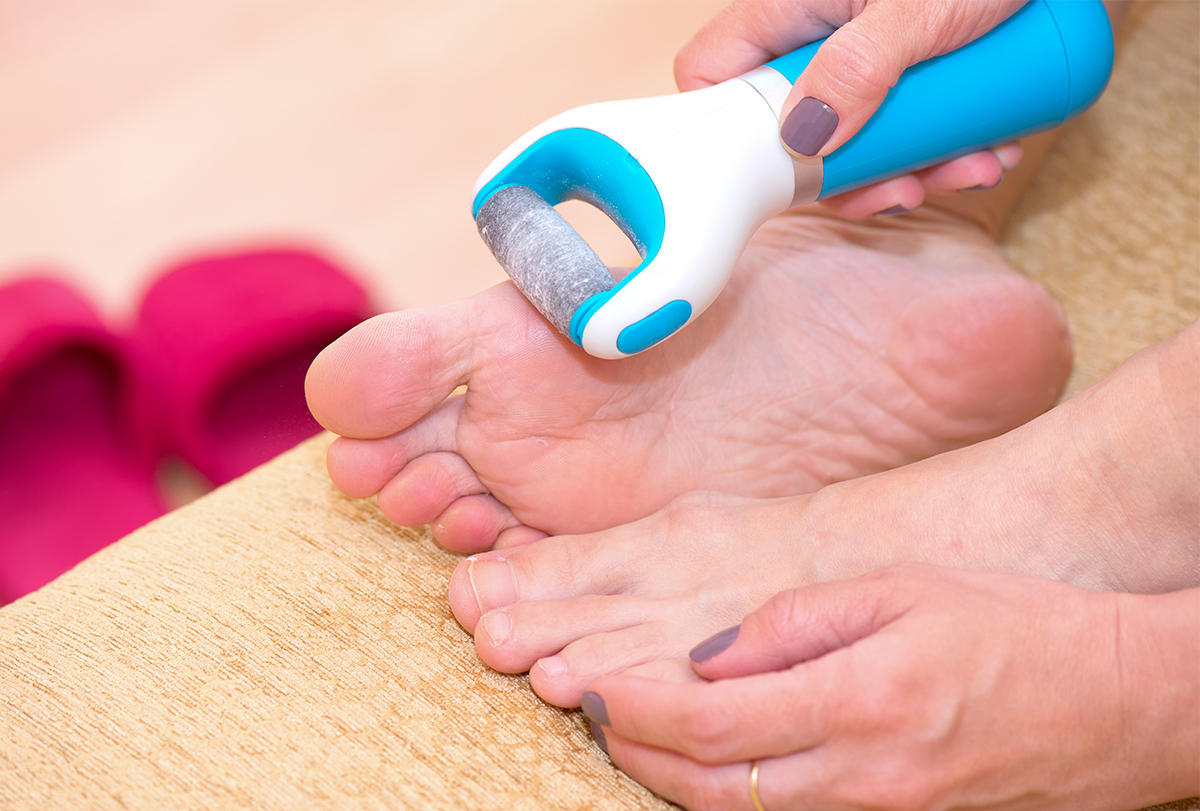
The treatment for an itchy foot depends on its cause. In general, it is vital to maintain proper hygiene to avoid itchiness. You may consult a dermatologist if the itch is severe.
Home Remedies for Itchy Feet
You can manage itchy feet at home using ingredients that you may already have at your disposal.
1. Dip your foot in Dead Sea salts/Epsom salt baths
Soak your feet in salt water to help manage the athlete’s foot or psoriasis and the associated itching.
How to use:
- Add Epsom salts or Dead Sea salts to a basin of warm water.
- Soak your feet in the solution for 15 minutes.
- Pat your feet dry and apply a moisturizer.
2. Perform oil massage
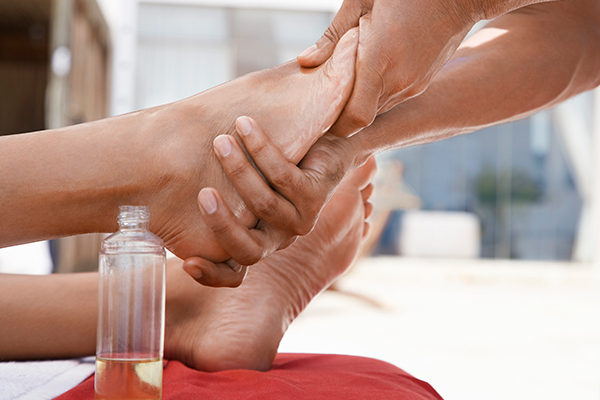
Oil therapy hydrates and soothes the skin. Moreover, it helps stimulate lymph circulation, enhances tissue function, and promotes relaxation.
How to use:
- Massage your itchy feet with olive oil or coconut oil.
- You can add essential oils that have anti-inflammatory properties, such as peppermint, lavender, chamomile, or tea tree oil, to these oils for added benefit. (1)
3. Apply aloe vera gel
Use aloe vera gel to moisturize the area and soothe the itching. It also helps alleviate the redness and scaling associated with psoriasis.
How to use:
- Extract fresh aloe vera gel and apply it to the affected skin.
- You may also use OTC creams containing aloe vera.
4. Try over-the-counter medications
Different over-the-counter medications are available for itchy feet, depending on the cause.
How to use:
- Use antihistamines, such as Benadryl, to combat allergic reactions.
- Dust medicated powders on the inside of your shoes to prevent moisture accumulation.
- Try antifungal and antiseptic soaps for managing eczema and athlete’s foot.
- Wash your feet with diluted bleach for its antiseptic effect.
5. Wash with apple cider vinegar
Apple cider vinegar (ACV) has been anecdotally used for managing itchy feet caused by eczema. However, no studies support its use.
How to use:
- Mix equal parts ACV and water and apply the solution to your feet.
- Follow this with coconut oil or cocoa butter application to moisturize your feet.
6. Use baking soda
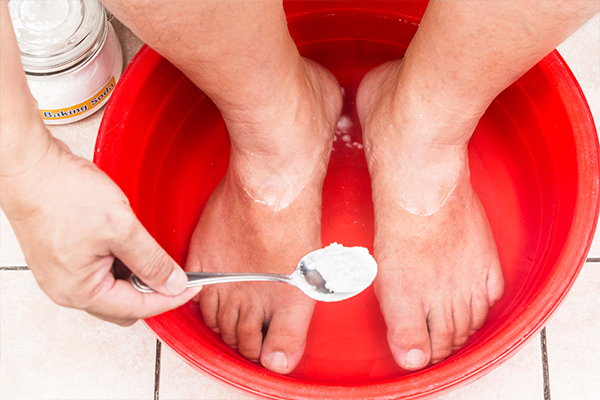
Itchy skin due to psoriasis can be treated with a paste of baking soda. It is a traditional remedy, as pointed out by an old study. (2)
How to use:
- Mix ¼ cup of baking soda in your bathwater.
- Mix a small amount of water and baking soda to make a paste and apply it directly to the skin.
7. Take an oatmeal bath
Oatmeal helps hydrate the skin and also acts as a natural exfoliant.
How to use:
- Add colloidal oatmeal in your bath to help soothe the itching. An oatmeal bath can be substituted with a milk bath for its relaxing effects.
- Mix a small amount of water and colloidal oatmeal to make a paste and apply it directly to the skin.
8. Use a cold compress
Applying a cold compress to skin that itches can provide a soothing effect.
How to use:
- Apply a cold, wet cloth to the affected area.
- You can also wrap some ice in a cloth and gently press on the affected area to alleviate the inflammation.
9. Exfoliate your skin
Use a pumice stone to remove dry, dead skin from your feet. Apply a moisturizer after.
Self-Care and Prevention Tips

Take these steps to prevent and relieve itchy feet:
- Use soap and laundry detergent that does not cause irritation.
- Use low-pH cleansers.
- Limit your time in the shower or bathtub.
- Dry well in between toes after showers or baths.
- Control excessive sweating of the feet by using foot powder.
- Wear dry, clean socks.
- Wear shoes of breathable material, such as mesh.
- Avoid walking barefoot, especially in public places.
- Wear protective gear when outdoors to prevent contact with plants or environmental factors that could cause an itch response.
- Use sunscreen to prevent skin damage.
- Hydrate. Drink plenty of water.
- Join group psychotherapy or support groups.
Precautions
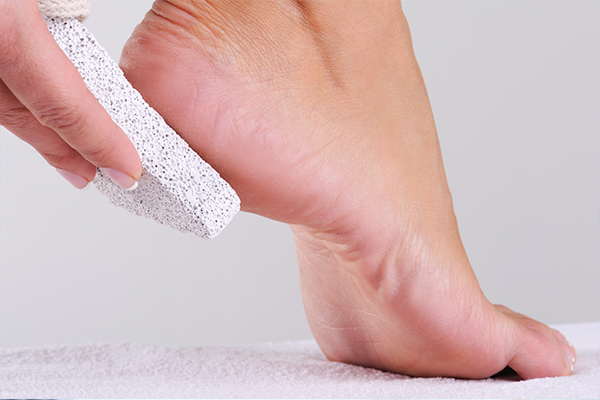
Prevent itchy feet at night to get a good night’s rest, and break free from the annoying burden of constant itching by following these precautions:
- It is important to schedule annual checkups with your primary care physician to rule out systemic conditions that could cause itchy feet.
- Something simple you can do yourself at home is to evaluate the skin of your feet every day to check for any abnormal changes.
- Make sure to moisturize dry skin daily. Conversely, keep excessively moist skin dry.
- Control your blood sugar if you are diabetic to prevent loss of sensation in your feet.
- Protect your feet from environmental factors that can cause irritation.
- Proper foot hygiene can also prevent bothersome itchy feet.
- Be mindful of any allergies and avoid factors that may induce a reaction.
- Use a humidifier, especially in winter, to prevent dry skin.
- Avoid wearing wool that irritates the skin.
- Bathe in cool or lukewarm water. Hot water can cause dry skin.
Most-Asked Questions About Itchy Feet
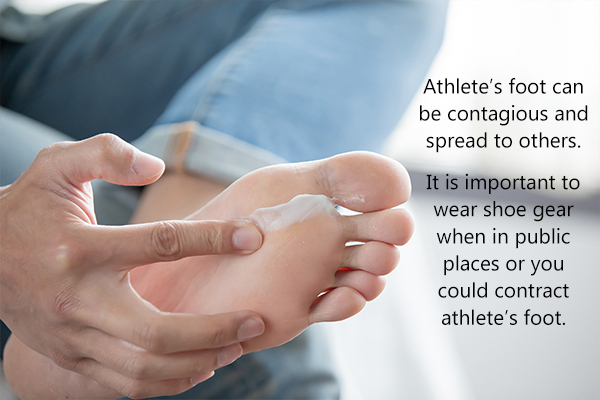
Are itchy feet contagious?
Itchy feet can be contagious, depending on the circumstance. Athlete’s foot can be contagious and spread to others. It can also spread to other parts of your body. So avoid touching your feet if you have athlete’s foot. Also, make sure to wash your hands well after touching your feet.
Why does an itchy foot worsen at night?
Changes in the skin function, temperature, and moisture levels that occur at night may worsen the itch at this time of the day. There is a complicated interaction between the circadian rhythm, inflammatory mediums, and psychological elements that can cause the itch to worsen at night. (3)
Final Word
Itchiness in the feet is generally a mild discomfort. However, in some cases, it can indicate an allergic response or a more severe problem. Fortunately, various medications are available to help manage the causes of itchy feet, such as psoriasis and eczema.
It is recommended to keep your feet clean and moisturized to prevent itching and other problems. Several home remedies can also help relieve the itch and relax your feet.

- Was this article helpful?
- YES, THANKS!NOT REALLY


